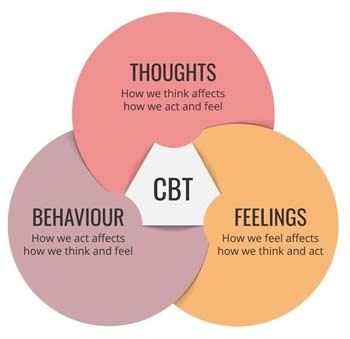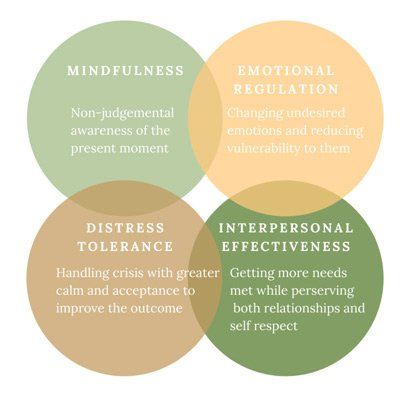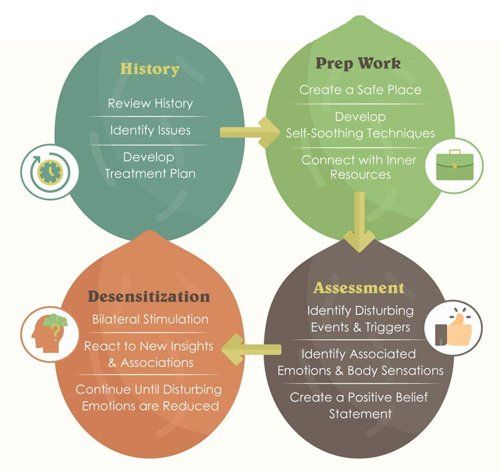Types of Therapy
An explanation of the specialized therapies we use here at the Clinic for Christian Counseling to help you get unstuck.
Cognitive Behavioral Therapy
Cognitive behavioral therapy (CBT) is a type of treatment that helps people learn how to identify and change the destructive or disturbing thought patterns that have a negative influence on their behavior and emotions.
Cognitive behavioral therapy focuses on changing the automatic negative thoughts that can contribute to and worsen our emotional difficulties, depression, and anxiety. These spontaneous negative thoughts also have a detrimental influence on our mood.
Through CBT, faulty thoughts are identified, challenged, and replaced with more objective, realistic thoughts.


Dialectical Behavioral Therapy (DBT)
Dialectical behavior therapy (DBT) is a modified type of cognitive behavioral therapy (CBT). Its main goals are to teach people how to live in the moment, develop healthy ways to cope with stress, regulate their emotions, and improve their relationships with others.
DBT was originally intended to treat borderline personality disorder (BPD), but it has been adapted to treat other mental health conditions. It can help people who have difficulty with emotional regulation or are exhibiting self-destructive behaviors (such as eating disorders and substance abuse disorders). This type of therapy is also sometimes used to treat post-traumatic stress disorder (PTSD).
EMDR
EMDR is an evidenced-based treatment which falls under the umbrella of Adaptive Information Processing. Anytime we experience a trauma, information is stored within the brain and cells of the body. We can remember sights, sounds, smells, and body sensations all associated with an event. When these memories are either not processed, or processed maladaptively, people can have an experience in the present, which triggers these memories from the past, keeping the person stuck in a loop of maladaptive thinking, feeling, believing, and behaving. Once the memories are processed, through the use of bilateral stimulation (eye movements, tapping, or sound), the brain is able to reorganize the information, thereby desensitizing the body/mind, and enabling the person to experience the freedom of living in the present moment, unbound by past experiences.
The eye movements used in this treatment are said to create a similar effect to that produced during the REM stage of sleep. The brain re-processes the information, from the very root which created the problem. While it may seem daunting to have to go through memories, EMDR is a structured, safe, effective, evidenced-based therapy. EMDR allows for one to remain fully grounded in the present moment, ensuring the avoidance of additional trauma. And, you don’t have to go into any detail, as the details are not as important as the overall feelings, thoughts, and sensations.
EMDR is especially effective in people who have PTSD and can also be useful for people who have Anxiety, Phobias, Mood Disorders, Sleep Disorders, Grief, Addiction, Low Self Esteem, and Depression. People are generally able to recover physically and emotionally much quicker using EMDR than traditional talk therapy which can take years to process life events verbally.
Resources for more information on EMDR
https://www.emdr.com/what-is-emdr/
https://emdrresearchfoundation.org/


Play Therapy
Play Therapy is a form of therapy that requires a counselor to come down to the child’s level and speak in the child’s own language. The most familiar mode of expression for a child is play. In this type of therapy, toys are like the child’s words, through which the child is encouraged to explore feelings, to understand and accept those feelings, and furthermore to process their thoughts and feelings using imagination and creativity.
Play Therapy is widely used to treat emotional problems and behavioral disorders of children because it fully meets their unique developmental needs. In most children under 11 years of age the capacity for abstract thinking as well as understanding complex issues, motivation and emotions, is not fully developed. Only specific counselors at the clinic are certified to engage in Play Therapy with their clients.
Walk and Talk Therapy
Walk and Talk Therapy, also considered outdoor therapy, is best described as taking a traditional counseling session outdoors. Walking side-by-side – client and counselor – the session may also incorporate the outdoors environment as part of the therapeutic work, such as by using natural grounding tools or nature-based metaphors.
Walk and Talk Therapy at our Eau Claire location takes place on the Bullis Pond Trail located behind the CCC agency. Only specific counselors at the clinic are certified to engage in Walk and Talk Therapy with their clients.


